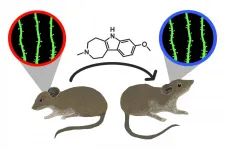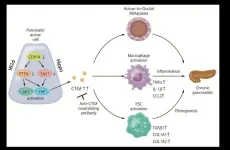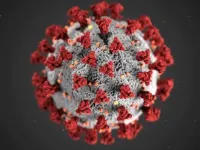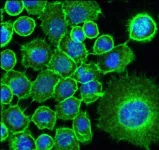(Press-News.org) New research from the Clemson University Center for Human Genetics has identified specific cell clusters in the brain of the common fruit fly affected by acute cocaine exposure, potentially laying the groundwork for the development of drugs to treat or prevent addiction in humans.
While cocaine's neurological effects are well known, the underlying genetic sensitivity to the drug's effects is not. In human populations, susceptibility to the effects of cocaine varies due to both environmental and genetic factors, making it challenging to study. Approximately 70 percent of genes in the fruit fly, Drosophila melanogaster, have human counterparts, providing researchers with a comparable model when studying complex genetic traits.
Geneticists Trudy Mackay and Robert Anholt's collaborative research found cocaine use elicits rapid, widespread changes in gene expression throughout the fruit fly brain - and that the differences are more pronounced in males than females.
Flies exposed to cocaine showed impaired locomotor activity and increased seizures. The study showed all types of fly brain cells were affected, especially Kenyon cells in the fly brain's mushroom bodies and some glia cells. Mushroom bodies, which get their name because they look like a pair of mushrooms, are integrative brain centers that are associated with experience-dependent behavioral modifications.
These findings could eventually lead to therapeutics.
"This research identifies the regions of the brain which are important," said Mackay, the Self Family Endowed Chair in Human Genetics. "Now, we can see what genes are expressed when exposed to cocaine and whether there are Federal Drug Administration-approved drugs that could be tested, perhaps first in the fly model. We've already spotted several of these genes. This is a baseline. We can now leverage this work to understand potential therapy."
THE RESEARCH
In the study, male and female flies were allowed to ingest a fixed amount of sucrose or sucrose supplemented with cocaine over no more than two hours.
Researchers observed their behavior after cocaine ingestion and found evidence that exposure to cocaine results in physiological and behavioral effects, including seizures and compulsive grooming.
To assess the effects of cocaine consumption on brain gene expression, the researchers dissected the fly brains and dissociated them into single cells. The researchers used next-generation sequencing technology to make libraries of the expressed genes for individual cells. Each cell has thousands of transcripts.
The study looked at 88,991 cells.
Through sophisticated statistical analysis, the researchers could group them into 36 distinct cell clusters. Annotation of clusters based on their gene markers revealed that all major cell types - neuronal and glial - as well as neurotransmitter types from most brain regions, including mushroom bodies, were represented.
"We found the effects of cocaine in the brain are very widespread, and there are distinct differences between males and females. There is substantial sexual dimorphism," said Anholt, Provost's Distinguished Professor of Genetics and Biochemistry. "We built an atlas of sexually dimorphic cocaine-modulated gene expression in a model brain, which can serve as a resource for the research community."
ULTRA-POWERFUL
The single-cell technique is ultra-powerful and offers impressive advantages over standard gene expression profile studies.
"If an entire brain is used and there's heterogeneity of gene expression, such that it's up in one cell and down in another, you don't see any signal. But with the single cell analysis, we're able to capture those very, very fine details that reflect heterogeneity in gene expression among different cell types. It is very exciting to apply this advanced technology here at the CHG," Mackay explained.
Mackay is one of the world's leading authorities on the genetics of complex traits. She has a longstanding interest in behavioral genetics and developing the fruit fly as a model for understanding the genetic basis of complex behaviors. Her laboratory developed the Drosophila melanogaster Genetic Reference Panel (DGRP), which now consists of 1,000 inbred fly lines with fully sequenced genomes derived from a natural population. The DGRP allows researchers to use naturally occurring variation to examine genetic variants that contribute to susceptibility to various stressors.
INFORMATION:
The findings were published in the prestigious journal Genome Research in a paper titled "The Drosophila brain on cocaine at single-cell resolution." Co-authors include CHG bioinformatician Vijay Shankar; graduate students Brandon Baker, Sneha Mokashi and Jeffrey Hatfield; and former Clemson student Rachel Hannah, now at Johns Hopkins University.
This research was supported by the National Institute on Drug Abuse Grant Number U01 DA041613. The content is solely the authors' responsibility and does not necessarily represent the funder's views.
The Center for Human Genetics is part of Clemson University's College of Science and is housed in Self Regional Hall, a state-of-the-art research facility located in Greenwood, South Carolina. Research in the center focuses on genomic, computational and comparative genetic approaches to gain insights in genetic and environmental risk factors for human diseases.
BOSTON -- A multidisciplinary team from MassGeneral Hospital for Children (MGHfC), Brigham and Women's Hospital and other institutions have identified the mechanism of how an extremely rare but serious post-COVID-19 complication develops in children and adolescents. Led by MGHfC pediatric pulmonologist Lael Yonker, MD, researchers determined that viral particles remaining in the gut long after an initial COVID-19 infection can travel into the bloodstream, instigating the condition called Multisystem Inflammatory Syndrome in Children (MIS-C).
The syndrome can occur several weeks after an initial infection; symptoms include high fever, abdominal pain, vomiting, diarrhea, rash and extreme fatigue. The hyperinflammatory ...
A novel compound similar in structure to the psychedelic drug ibogaine, but lacking its toxic and hallucinogenic effects, has been found to rapidly reverse the effects of stress in mice.
Researchers found that a single dose of tabernanthalog (TBG) can correct stress-induced behavioral deficits, including anxiety and cognitive inflexibility, and also promotes the regrowth of neuronal connections and restores neural circuits in the brain that are disrupted by stress. The study was published May 25 in Molecular Psychiatry.
"It was very surprising that a single treatment with a low dose had such dramatic effects within a day," said corresponding author ...
Invasive alien plants are plant species that grow in an environment outside their native habitat. If they successfully establish self-sustaining populations in these new environments - an event called "naturalization" - they can have considerable negative impacts on local ecosystems, economies, and societies. But not all alien plant species are equally effective in invading new habitats. Therefore, an international team of scientists, headed by Konstanz-based biologist Professor Mark van Kleunen, investigated different types of "invasiveness" and possible factors that determine invasion success of alien plants in Europe.
The new study, published in PNAS, describes ...
Osaka, Japan - Chronic inflammation of the pancreas is a debilitating disease with poorly understood causative factors. Now, researchers at Osaka University have identified the disturbed molecular pathways and revealed the underlying mechanisms that may inform an effective and much-needed therapeutic strategy.
The pancreas is an important organ with a dual role in digestion and the production of various hormones including insulin and glucagon that fine-tune blood sugar levels.
Chronic pancreatitis (CP) is characterized by inflammation of the gland ...
In the latest National Autism Indicators Report, researchers from Drexel University's A.J. Drexel Autism Institute examined surveys of family members of autistic adults who use Developmental Disability services, and found needs for additional supports like respite care and assistance to plan for crisis and emergencies, especially among families whose adult lived with them.
Data from the surveys showed over one quarter of families with autistic adults who use Developmental Disability services and live with family do not have enough services or supports for themselves, according to the report. And over half of these ...
LA JOLLA--In a new paper, scientists from La Jolla Institute for Immunology (LJI) bring together research findings from COVID-19 researchers around the world. The results are striking: human T cells can target more than 1,400 sites on the SARS-CoV-2 virus.
"Our lab and many others have shown this very broad and diverse T cell response," says LJI Research Assistant Professor Daniela Weiskopf, Ph.D., co-author of the Cell Host & Microbe review.
This kind of research review, called a "meta-analysis," pools the results of multiple studies, and the researchers give close consideration to how the studies were conducted.
In the case of COVID-19, a global meta-analysis of T cell response studies is especially helpful because different patient populations ...
An in vitro study conducted by a group of researchers at São Paulo State University (UNESP) in Araraquara, Brazil, shows how fungi and bacteria can activate genes associated with head and neck tumors, as the metabolism of biofilms (communities in which these microorganisms self-organize in a structured and coordinated manner) stimulate tumor cells by favoring the cell signaling pathways required for tumor development and resistance to treatment. The findings include entirely novel information on the links between microbial biofilms and cell behavior in head and neck cancer.
The researchers discovered that metabolites secreted by biofilms, termed the secretome, can modulate the expression of proto-oncogenes and cell cycle genes associated with tumor cell growth and survival. Their analysis ...
Geothermal ecosystems, such as volcanoes and hot terrestrial and deep-sea springs, are characterized by severe conditions. The temperatures are high and the environment could be extremely acidic or very alkaline. Moreover, there are chemically active compounds in them that can be fatal to living organisms, because they are capable of destroying the membrane of an ordinary cell.
"Exclusively very adapted microorganisms can exist here. They do not only have unique protective systems but are also able to get energy from chemical transformations of those substances that are available to them. Humans are actively using the ...
BOSTON - In a surprising discovery, researchers at Massachusetts General Hospital (MGH) identified a mechanism that protects the brain from the effects of hypoxia, a potentially lethal deprivation of oxygen. This serendipitous finding, which they report in Nature Communications, could aid in the development of therapies for strokes, as well as brain injury that can result from cardiac arrest, among other conditions.
However, this study began with a very different objective, explains senior author Fumito Ichinose, MD, PhD, an attending physician in the Department of Anesthesia, Critical Care and Pain Medicine at MGH, and principal investigator in ...
Bottom Line: In a new recommendation statement, the U.S. Preventive Services Task Force (USPSTF) recommends that clinicians offer pregnant adolescents and adults effective behavioral counseling interventions aimed at promoting healthy weight gain and preventing excess gestational weight gain in pregnancy. Excess weight at the beginning of pregnancy and excess gestational weight gain have been associated with adverse maternal and infant health outcomes such as a large for gestational age infant, cesarean delivery or preterm birth. The USPSTF routinely makes recommendations about the effectiveness of preventive care ...






